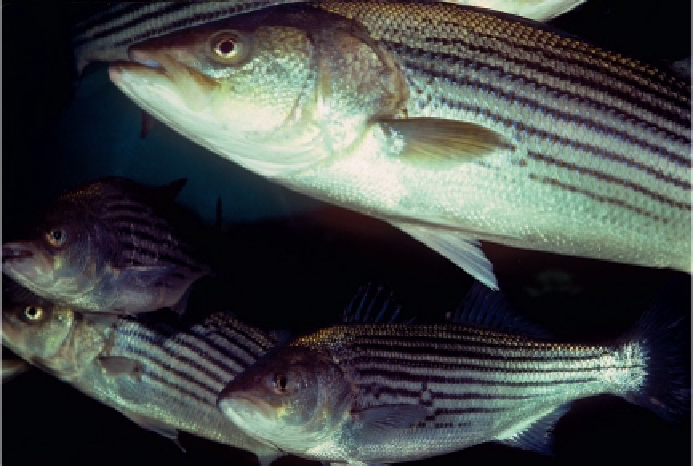Geoscience Reference
In-Depth Information
year round in the bay, which serves as the nursery for juvenile striped bass on the Atlantic coast. Seventy to 90
percent of the Atlantic population spawn and spend their first years of life in the bay, where they feed on a
variety of small crustaceans, including blue crabs. In 2000, a study estimated that striped bass, or rockfish as
they are better known in the Chesapeake, were eating approximately 75 million small blue crabs that take
refuge in the underwater grass beds in the middle of the bay. Large as this number appears to be, it is only 5
percent of the total population of young crabs taking shelter there. Rockfish themselves were severely depleted
by overfishing and were on the brink of collapse when a moratorium was declared in the early 1980s. Their
numbers rebounded to historical levels by the end of the decade.
Like blue crabs, striped bass are voracious predators, preying on a variety of marine life. Perhaps their most
important prey is menhaden, another member of the herring family, and as such a filter feeder, straining plank-
ton through its gill rakers. It is arguably the most important fish species in the bay ecosystem. As the biologist
W.K. Brooks noted in 1903, “All our best and most valued food fishes are only menhaden in another shape.”
The decline in the menhaden population in Chesapeake Bay has led some scientists to suggest that, as a result,
striped bass may be suffering from malnutrition, which in turn has led to high levels of a chronic wasting dis-
ease known as mycobac-teriosis. If so, this condition serves as another example of how the abundance and
health of one species may affect the welfare of another in this closely interconnected estuarine ecosystem.
AMERICAN SHAD
Chesapeake Bay serves as a nursery for striped bass, or rockfish, for the entire Atlantic coast population.
Ecosystem Engineers
The eastern oyster occurs in coastal waters from the Gulf of St. Lawrence to Argentina, but like the blue crab
and shad it has played a historically important role in Chesapeake Bay. Chesapeake is an Algonquian word


